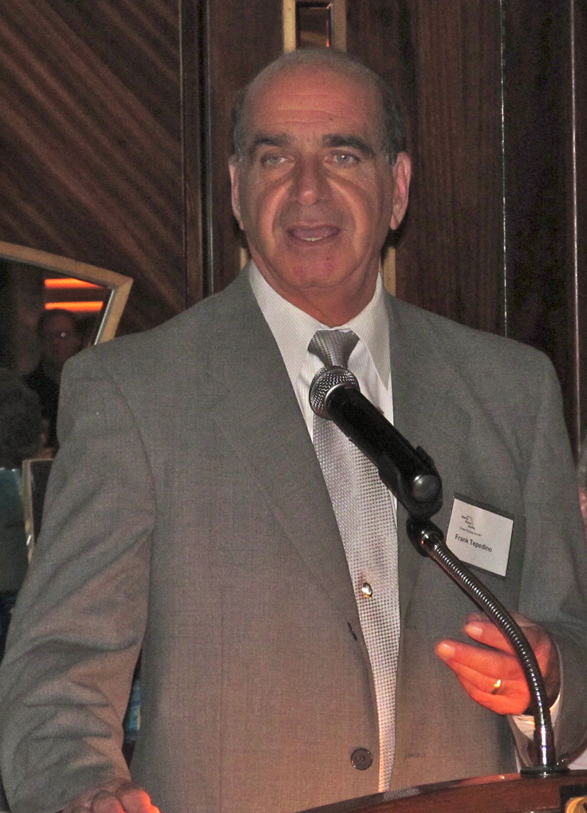All is quiet at the Tepedino household in Hauppauge, L.I., at 3 a.m. in late November 1971. But amidst the drone of crickets chirping outside, another sound echoes from the kitchen: ice cubes ricocheting back and forth against the inside walls of a stainless steel cocktail shaker. Frank Tepedino, a professional baseball player, has gotten out of bed to fix himself a mixed drink.
Tepedino is an alcoholic.
“I actually wanted that drink at that time,” Tepedino said. “Not coffee, not a cold glass of water, not a cold glass of milk. I wanted that drink.”
As he turns around with drink in hand, Tepedino sees his reflection in the mirror. He asks himself aloud, “What in the world am I doing? Are you kidding me?”
Tepedino, 65, developed his addiction at age 19. Though he drank for 25 years, he eventually kicked his addiction and now serves as the president of the Long Island-based Firefighters Charitable Foundation, which donates funds to volunteer firehouses and families who have been affected by fires.
Growing up attending St. Blaise Parish, Crown Heights, Tepedino was actually a talented football player at Samuel J. Tilden H.S., East Flatbush, but his mother did not want him to play the potentially dangerous sport. He transferred to now defunct George W. Wingate H.S., Prospect-Lefferts Gardens, where he excelled in baseball.
Professional scouts noticed Tepedino during his junior year at Wingate. The Baltimore Orioles selected the 17-year-old first baseman/outfielder in the 1965 MLB Draft, but he was traded to the New York Yankees a year later.
“Frankie had the prettiest swing in baseball…just a pure swing,” said Fred Cambria, a former Pittsburgh Pirates pitcher from Cambria Heights who faced Tepedino in the minor leagues.
Early in his playing career, Tepedino drank sparingly. He would have a beer with his teammates after games at a time when alcohol was rampant in baseball. But as the years progressed, he started drinking more often.
Tepedino says that it would be impossible to pinpoint the exact start of his addiction. After two minor league seasons, Tepedino joined the Marine Corps in late 1966 to fight for his country in Vietnam. When he returned, he was way behind the baseball curve, so the stress could have played a role in his drinking.
Tepedino noted one contributing incident while playing with the Yankees’ Triple-A minor league affiliate, the Syracuse Chiefs. The Yankees, led by then-manager Ralph Houk, traveled to Syracuse for an exhibition game before the 1969 season.
“Houk called me off to the side and said, ‘After tonight’s game, we’re going to call you up to the Majors to play right field and a little first [base],’” Tepedino said.
However, when Tepedino turned on the nightly news, he saw that the Yankees had instead called up prospects Jimmy Lyttle and Tommy Shopay to the Major League roster. He was devastated and said those feelings were constantly in the back of his mind as his drinking habits increased.
“You get a little bit angrier, and the normal release is that you run to something,” Tepedino said. “That could have been part of it.”
Before long, alcohol controlled all aspects of Tepedino’s life. It’s a rite of passage for young boys to play catch with their father, but Tepedino’s sons, Frank and John, had a different experience. After a few minutes of playing, Tepedino would go inside to make a drink, play for a few more minutes and then make another drink.
He said he only played one game with a hangover in his eight-year career. He actually hit a home run that game, which was possibly the worst thing that could happen since it downplayed the addiction. He developed his own drinking routine that separated himself from those around him.
“I didn’t drink in front of people basically,” he said. “You can call it closest drinking. You drink on the sly. But there is no sly when it’s got a hold of you.”
After retiring from baseball in 1978, Tepedino worked for the New York City Fire Department, but he still struggled with his addiction. By 1993, his boss threatened to fire him if he didn’t seek help. He checked into a six-month outpatient treatment program at Southside Hospital in Bay Shore, L.I.
“No one else has the power to stop a person from their addiction,” he said. “The only one that can stop that is yourself.”
By speaking about his experiences and relying on his Catholic faith, Tepedino successfully completed the 12-step program, and he has not had a sip of alcohol since 1994.
“There are no solutions in a bottle,” he said. “The key to it is that you can go through life without picking up a drink.”
As president of the Firefighters Charitable Foundation, Tepedino has been given a second chance on life, and he’s using it in a way that benefits himself and others. It’s often said that God works in mysterious ways, and Tepedino’s story is a staple in the long list of examples.
“It’s incredible the way he survived the addiction and turned it into a positive way to give back to the community,” said Lori Tepedino, Frank’s wife.
Despite his troubled past, Tepedino said he would not change a thing if given the chance.
“It (his alcohol addiction) was probably the best thing that ever happened to me outside of love, family and children,” he said. “For me, it worked out excellent because I became a better person from it.”
So these days at 3 a.m. in Hauppauge, Tepedino’s head rests comfortably on his pillow – dreaming of how he can use his past to the positive benefit of others.
“If you have faith and believe in God,” he said. “Anything is possible.”
Video Game Review
If you know your RBIs from your ERAs, then “MLB 12: The Show” (Sony Computer Entertainment) might just be in your wheelhouse. Newcomers or casual gamers, however, may find the title a little dry. And, while parents can rest easy about this offering’s content, youngsters may be overwhelmed by its complexity.
The focus here is on simulation. The developers have done everything in their power to replicate the experience of a real Major League Baseball matchup, and in this they’ve succeeded.
The substance of the game – played for review on the PlayStation Vita – is situated within three main modes. The first is the “Normal Season” option in which the user takes on the role of a coach and attempts to guide a team to the World Series, while also participating as a batter, fielder and pitcher.
“Road to the Show” is the most inventive of the modes. It enables players to create a rookie and guide him through his career, from the minor leagues to (hopefully) major-league success. To achieve this ambitious goal, however, hours upon hours of play will be required.
Although modes like this open “MLB 12” up to a slightly wider range of enthusiasts, the majority of the game is unmistakably designed for purists.
– Adam Shaw, Catholic News Service


